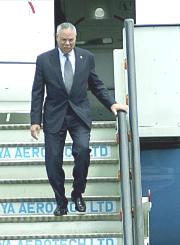Powell to visit Sudan next week to press Khartoum on Darfur crisis
WASHINGTON, June 24 (AFP) — US Secretary of State Colin Powell will travel to Sudan next week to press Khartoum on ending the crisis in the strife-torn western region of Darfur by disarming pro-government militias and easing humanitarian access, the State Department said.
 Sudan is currently designated a “state sponsor of terrorism” by Washington, and Boucher said Bush had personally signed off on Powell’s trip. Powell will be the highest-level US official to visit Sudan since 1978 when former secretary of state Cyrus Vance made a brief stop there.
Sudan is currently designated a “state sponsor of terrorism” by Washington, and Boucher said Bush had personally signed off on Powell’s trip. Powell will be the highest-level US official to visit Sudan since 1978 when former secretary of state Cyrus Vance made a brief stop there.
Powell will stop in Khartoum and Darfur after accompanying President George W. Bush to a NATO summit in Istanbul and while en route to a southeast Asian regional security meeting in Jakarta, spokesman Richard Boucher said.
Powell’s visit Tuesday and Wednesday is intended to boost US and international pressure on Sudan to rein in pro-government Arab militias accused of conducting an ethnic cleansing campaign in Darfur that some say constitutes genocide.
“The secretary’s visit to Sudan is intended to continue to call attention to the dire humanitarian situation in Darfur, to do whatever we can to stop the violence there and to make sure that the needy people of that region are receiving … supplies,” Boucher said.
Powell will also “make clear that we believe that much of the hardship is being caused by the violence perpetrated by the militias, that we know the militias are being supported by the government and that the government needs to bring those militias under control,” he said.
Despite the blunt message Powell will be delivering, Boucher said Sudanese authorities had said they would “welcome” the secretary’s visit, which will coincide with a trip to Sudan by UN Secretary General Kofi Annan.
At least 10,000 people have been killed and up to a million displaced in Darfur since black African rebels rose up in February 2003, accusing Khartoum of discrimination and neglect.
The government’s response was to give the militias free rein and they have been accused of conducting a scorched earth campaign in the fight against the rebel Justice and Equality Movement and the Sudan Liberation Movement.
The United Nations has called Darfur the world’s worst current humanitarian crisis and leaders of the Group of Eight industrialized nations, the United States and the European Union have all demanded that Khartoum take action to halt it.
Shortly after Powell’s trip was announced, the US ambassador at-large for war crimes, Pierre Prosper, told lawmakers that evidence suggested that “genocide” may be taking place in Darfur but that Washington had not yet made a legal determination on the issue.
“I can tell you that we see indicators of genocide and there is evidence that points in that direction,” Prosper said in testimony before the House International Relations Committee.
Such a determination, which would require action under international conventions, is now under active review, but Prosper and Boucher both said that the United States was not yet able to confirm that a genocide was occurring.
Washington is considering the imposition of sanctions on Sudanese officials and others affiliated with the militias and Prosper identified seven individuals by name who he said should “be investigated and brought to justice.”
Under heavy pressure, Sudanese President Omar el-Beshir announced last weekend that his Islamic government had ordered the army to disarm the militias, known as “Janjawid,” stabilize the region and prevent fighting from spilling over into neighboring Chad.
But that order has been greeted skeptically in Washington and in an interview with an Egyptian newspaper published Wednesday, Beshir accused unnamed foreigners of trying to take advantage of the crisis to intervene in Sudan’s affairs and denied his government was blocking aid.
“We’ve seen little follow-through on President Beshir’s declaration concerning stability in Darfur,” Boucher said, noting that promises to deploy police to protect civilians in refugee camps had not been fulfilled.
He said at least 301 villages had been attacked and destroyed by the militias and that another 76 had been damaged. He also said they had burned crops, killed or stolen cattle and destroyed irrigation systems.
“And we’ve not seen any action by the government to bring this under control.”
